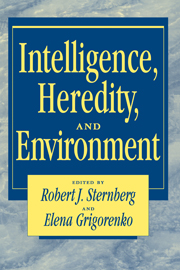Book contents
- Frontmatter
- Contents
- List of contributors
- Preface
- Part I The nature–nurture question: New advances in behavior-genetic research on intelligence
- Part II Novel theoretical perspectives on the genes and culture controversy
- Part III Specific issues in the nature–nurture controversy
- 12 Educating intelligence: Infusing the Triarchic Theory into school instruction
- 13 Raising IQ level by vitamin and mineral supplementation
- 14 The resolution of the nature–nurture controversy by Russian psychology: Culturally biased or culturally specific?
- 15 The emerging horizontal dimension of practical intelligence:Polycontextuality and boundary crossing in complex work activities
- 16 Cognitive development from infancy to middle childhood
- 17 Intelligence, language, nature, and nurture in young twins
- 18 Sources of individual differences in infant social cognition:Cognitive and affective aspects of self and other
- Part IV Integration and conclusions
- Name index
- Subject index
14 - The resolution of the nature–nurture controversy by Russian psychology: Culturally biased or culturally specific?
Published online by Cambridge University Press: 05 June 2012
- Frontmatter
- Contents
- List of contributors
- Preface
- Part I The nature–nurture question: New advances in behavior-genetic research on intelligence
- Part II Novel theoretical perspectives on the genes and culture controversy
- Part III Specific issues in the nature–nurture controversy
- 12 Educating intelligence: Infusing the Triarchic Theory into school instruction
- 13 Raising IQ level by vitamin and mineral supplementation
- 14 The resolution of the nature–nurture controversy by Russian psychology: Culturally biased or culturally specific?
- 15 The emerging horizontal dimension of practical intelligence:Polycontextuality and boundary crossing in complex work activities
- 16 Cognitive development from infancy to middle childhood
- 17 Intelligence, language, nature, and nurture in young twins
- 18 Sources of individual differences in infant social cognition:Cognitive and affective aspects of self and other
- Part IV Integration and conclusions
- Name index
- Subject index
Summary
The historical context in which the individual objects, large or small,…appear in their true relative meaning is itself a whole, in terms of which every individual thing is to be fully understood in its significance, and which in turn is to be fully understood in terms of these individual things
[Gadamer, Truth and Method, 1984, p. 156].Any theory, even in the natural sciences, is inevitably influenced by culture. A Russian atomic physicist conducting an experiment with elementary particles (what could be more culturally neutral?) at an American university joked that Russian and American atomic physics are like cousins – they share some genes in common, making them similar, but they were raised in different homes, leading to dissimilarities.
It has often been noted that although science is thought of as the dispassionate pursuit of facts, in reality it is much more than that. As Le Vay, a gay scientist who discovered a link between human brain structure and homosexuality, stated in an interview, “Everyone has some place they are coming from; every scientist is a human being” (Marshall, 1992).
We all view the world from our own perspectives. According to Stephen Jay Gould (Barinaga, 1992), it is a pervasive fact of human existence that we as social beings find it extraordinarily difficult to step outside our own convictions and see them through the eyes of a detached observer.
- Type
- Chapter
- Information
- Intelligence, Heredity and Environment , pp. 393 - 439Publisher: Cambridge University PressPrint publication year: 1996
- 2
- Cited by



